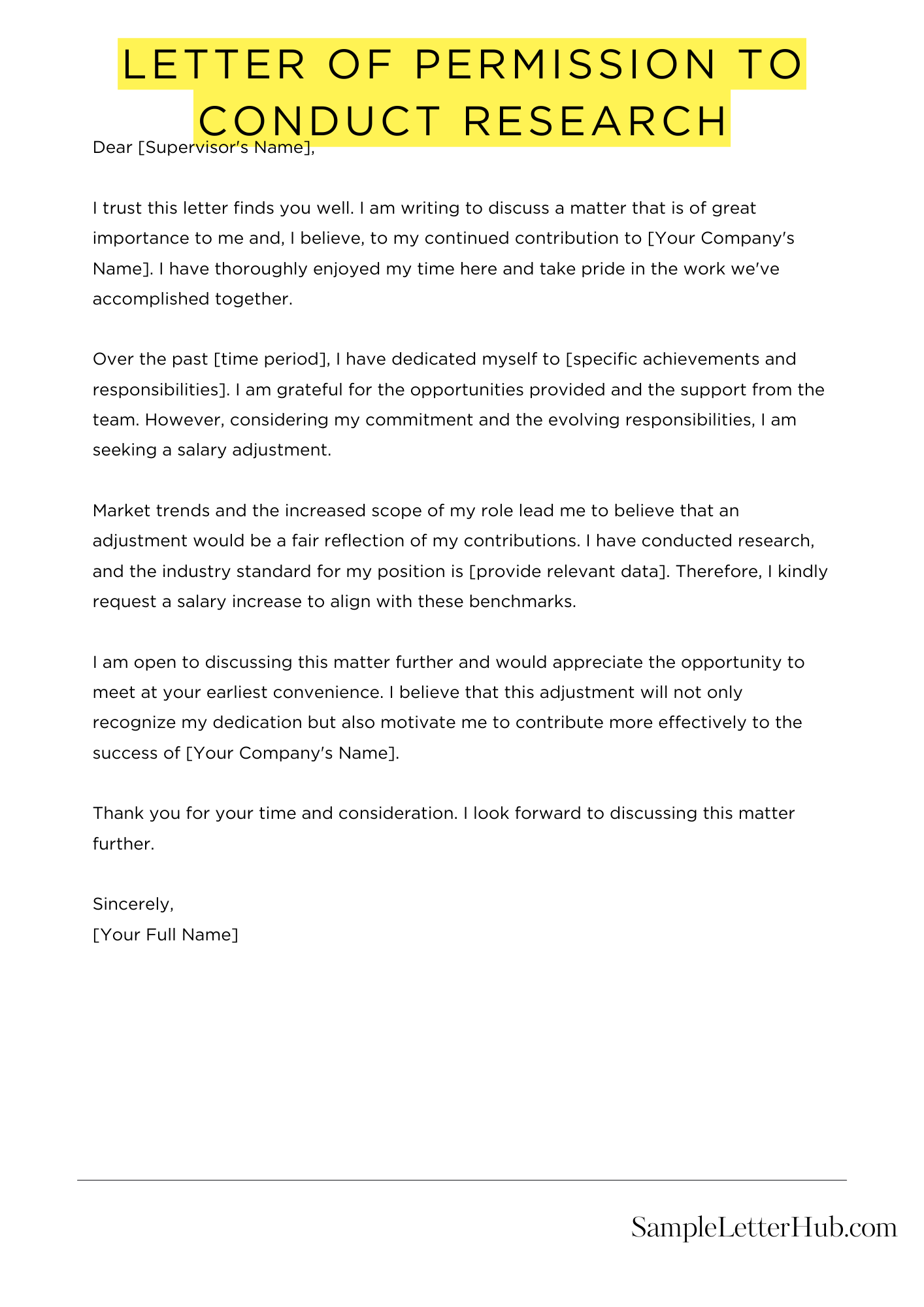A Letter of Permission to Conduct Research is a formal request to an individual or organization seeking permission to conduct research. It outlines the purpose, methodology, and ethical considerations of the research project.
In this article, we will provide you with templates, examples, and samples of Letters of Permission to Conduct Research. These samples will guide you in drafting a well-written letter that effectively communicates your research intentions and secures the necessary approvals.
Letter of Permission to Conduct Research
Dear [Recipient Name],
I am writing to request permission to conduct research at your organization. I am a researcher at [Your Institution] and I am currently working on a project that investigates [Research Topic].
I am interested in collecting data from [Data Source] at your organization. I believe that this data will be valuable in helping me to understand [Research Question].
I understand that you may have concerns about the confidentiality of your data. I assure you that I will take all necessary precautions to protect the privacy of your participants. I will only collect data that is necessary for my research and I will not share it with any third parties.
I would be grateful if you would consider my request. I am available to meet with you at your convenience to discuss my research project in more detail.
Thank you for your time and consideration.
Sincerely,
[Your Name]

How to Write a Letter of Permission to Conduct Research
When you are conducting research, it is important to obtain permission from the individuals or organizations that you will be studying. This is especially important if your research involves collecting data from human subjects or if you will be using copyrighted materials.
1. Identify the appropriate person or organization to contact
The first step is to identify the appropriate person or organization to contact for permission. This may be the individual who is the subject of your research, the head of an organization, or a copyright holder.
2. Write a clear and concise letter
Your letter should be clear and concise, and it should state the purpose of your research and the specific data or materials that you would like to use. You should also include a brief description of your research methods and how you will protect the privacy of your subjects.
3. Be respectful and professional
It is important to be respectful and professional in your letter. You should address the person or organization by their proper title and use formal language. You should also be clear about your intentions and avoid making any promises that you cannot keep.
4. Include a self-addressed stamped envelope
If you are requesting a written response, be sure to include a self-addressed stamped envelope. This will make it easier for the person or organization to respond to your request.
5. Follow up
If you do not receive a response within a few weeks, you may want to follow up with a phone call or email. Be polite and persistent, but do not be pushy.
6. Be prepared to negotiate
In some cases, the person or organization that you are contacting may be willing to grant you permission, but they may have certain conditions. Be prepared to negotiate and compromise in order to reach an agreement that is acceptable to both parties.
7. Get everything in writing
Once you have reached an agreement, be sure to get everything in writing. This will protect both you and the person or organization that you are studying.
FAQs about Letter Of Permission To Conduct Research
What is a letter of permission to conduct research?
A letter of permission to conduct research is a formal document that grants permission to a researcher to conduct research on a specific topic or within a specific setting. It typically outlines the scope of the research, the methods to be used, and the expected duration of the study.
Who needs a letter of permission to conduct research?
Researchers who plan to conduct research involving human participants, sensitive data, or access to restricted areas or populations may need to obtain a letter of permission. This is especially important when the research involves vulnerable populations or involves the collection of personal information.
What are the key elements of a letter of permission to conduct research?
A letter of permission to conduct research should typically include the following elements:
- The name and affiliation of the researcher
- The purpose and objectives of the research
- The methods to be used
- The expected duration of the study
- A statement of confidentiality and ethical considerations
- The signature of the authorized individual granting permission
How do I obtain a letter of permission to conduct research?
The process for obtaining a letter of permission to conduct research can vary depending on the institution or organization involved. In general, researchers should contact the appropriate authority (e.g., an institutional review board, research ethics committee, or gatekeeper) to inquire about the requirements and procedures for obtaining permission.
What are the consequences of not obtaining a letter of permission to conduct research?
Failing to obtain a letter of permission to conduct research can have several consequences, including:
- Denial of access to research participants or data
- Delay or suspension of the research project
- Ethical concerns and potential harm to research participants

